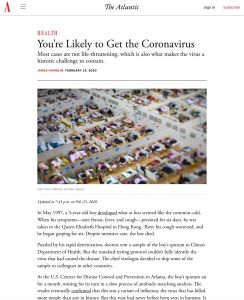
Article
You’re Likely to Get the Coronavirus
Most cases are not life-threatening, which is also what makes the virus a historic challenge to contain.
The Atlantic,
2020
References:
Bai et al. (2020)
Read or listen offline
Amazon Kindle
auto-generated audio
1×
Log in to listen to the audio summary.
auto-generated audio
Recommendation
You’re washing your hands, practicing social distancing and coughing into your arm like a good citizen, but will this stop the spread of COVID-19? Your efforts may slow the spread, which offers social benefits, but the ship probably already sailed when it comes to actually stopping the virus. So will the world be able to pull it together and limit impending global disaster? James Hamblin, MD explains the barriers to a happy COVID-19 resolution in this article from The Atlantic, and describes what would be necessary for effective global responses to future pandemics.
Summary
About the Author
Dr. James Hamblin lectures at the Yale School of Public Health. He’s a regular contributor to The Atlantic, and author of Clean, which will be released in July 2020.
By the same author
Article
Learners who read this summary also read
Podcast
Book
















Comment on this summary